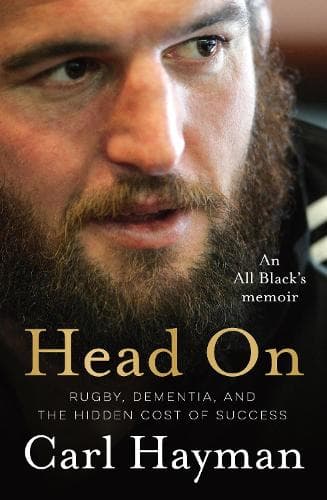Review: Head on: An All Black's memoir of rugby, dementia, and the hidden cost of success
Reviewed by Michael Burgess
As a long time journalist, it’s easy to be a bit cynical about autobiographies of famed sporting figures. They can be polished and protective affairs, willing to reveal on certain subjects but closed in other areas.
Such books can gloss over – or even ignore – difficult times or controversial incidents. That’s understandable but can be frustrating, leaving readers and fans feeling like they haven’t had the full picture. There is no chance of that with Head On.
It’s completely unvarnished and brutally honest, to the point where some might wonder if too much is being revealed. But it’s compelling and confronting and sets a new benchmark for sporting memoirs, one that will be hard to top. Hayman spares nothing and gives everything. There are many tragic aspects to his tale but he refuses to hide from it and admits the story telling process has been cathartic.
Hayman was a prodigy, starring for Otago and the Highlanders as a teenager, before being capped by the All Blacks as a 21-year-old. Regarded as probably the best prop in the sport, he left New Zealand as a 27-year-old to chase financial security in Europe where he had a storied career with Newcastle and Toulon and was reputed to be the highest paid player in the sport.
But there was a massive cost.
As Hayman says in the opening chapter, ‘I am a living, breathing, suffering cautionary tale.’ He spent 17 years as a professional rugby player and won trophies, accolades and acclaim, across almost 450 matches. But he lost so much more.
Hayman’s brain is damaged – beyond repair. At the age of 41, he has early onset dementia and has been diagnosed with probable chronic traumatic encephalopathy (CTE) from the constant collisions with teammates, opponents and scrum machines.
It's jarring stuff. You can feel the pain when he is unable to recall his son’s name for a passport application or is composing suicide notes in his head during a particularly dark time. He details his marriage breakdown – which included an appearance in a French court for domestic assault – and his struggles with booze, a product of the hard drinking rugby culture of his time, that escalated in parallel with his cognitive and mental health challenges.
‘I have to own this simple, four word sentence. I am an alcoholic.’
But even with the grim episodes, it’s a delightful read about a fascinating human moving from his idyllic childhood on a Taranaki farm to the intense tribal atmosphere of French rugby. It takes you inside professional sport and the All Blacks, including the ill-fated 2007 World Cup campaign and offers a window into the evolving knowledge of CTE and neurodegenerative diseases and the search for answers.
Hayman went under the radar for much of his career, due to his general media reticence, then the exit from New Zealand in his prime, which makes the story even sharper. Veteran journalist Dylan Cleaver was the ideal choice as ghostwriter. He brings an engaging, economical style that perfectly captures the essence and voice of Hayman, helped by sections from diary entries made at the time. By the end you feel like you know Hayman better than a close friend, such is the quality and depth of the prose.
The non-linear structure is well paced and cleverly framed. The opening chapters hit hard but there are still plenty of surprises to come. At the end, it's hard to underplay Hayman’s courage. The courage to bare his soul, the courage to own his failings and the courage to focus on helping others, despite his plight.
But most of all the courage to face his future – which has more uncertainty that most of us could ever imagine – and whatever it may bring: ‘I’m not the same person I was when I was younger. In five years’ time I won’t be the same person who wrote this book. But I’m still Carl Hayman.’
It’s a book that will have extremely wide appeal, far beyond rugby fans and sporting types, because as a human tale it’s hard to top.
Reviewed by Michael Burgess
